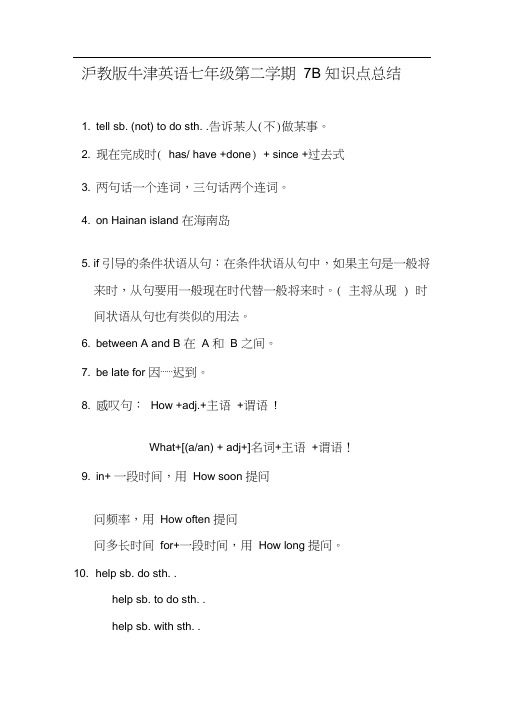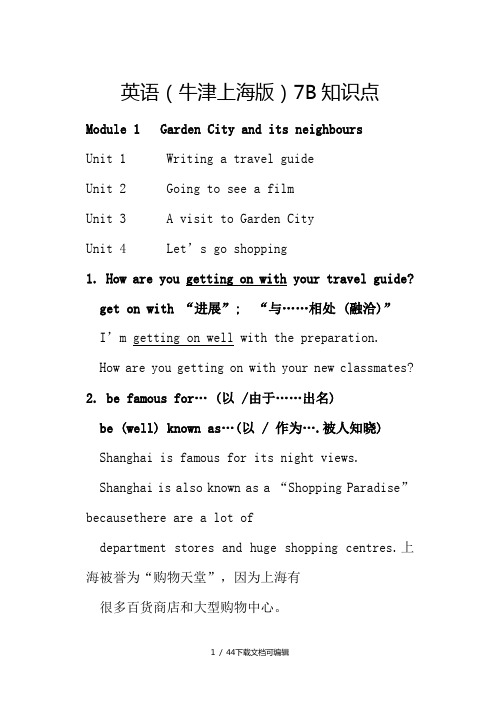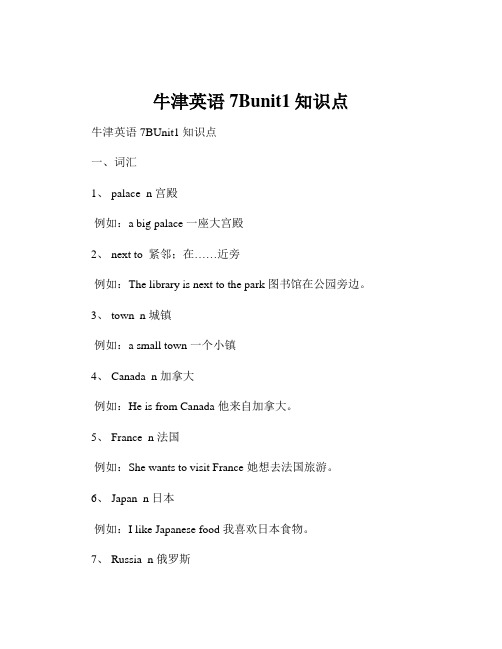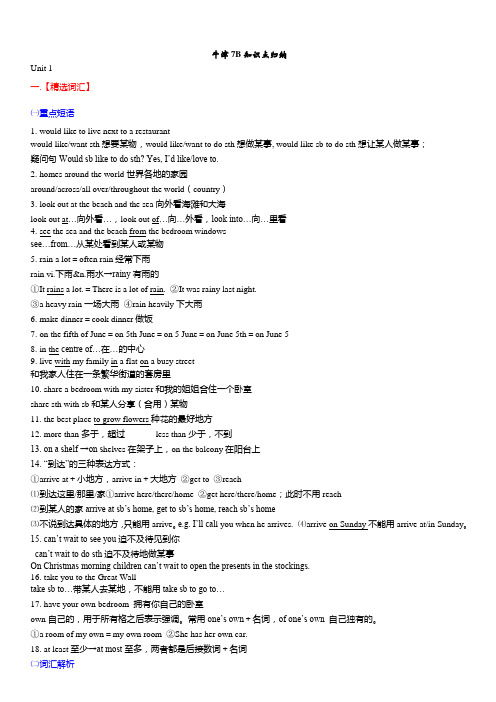牛津英语7B知识框架
(完整word)沪教版牛津英语七年级第二学期7B知识点总结,推荐文档

沪教版牛津英语七年级第二学期7B 知识点总结1. tell sb. (not) to do sth. .告诉某人(不)做某事。
2. 现在完成时( has/ have +done) + since +过去式3. 两句话一个连词,三句话两个连词。
4. on Hainan island 在海南岛5. if 引导的条件状语从句:在条件状语从句中,如果主句是一般将来时,从句要用一般现在时代替一般将来时。
( 主将从现 ) 时间状语从句也有类似的用法。
6. between A and B 在 A 和 B 之间。
7. be late for 因⋯⋯迟到。
8. 感叹句:How +adj.+主语+谓语!What+[(a/an) + adj+]名词+主语+谓语!9. in+ 一段时间,用How soon 提问问频率,用How often 提问问多长时间for+一段时间,用How long 提问。
10. help sb. do sth. .help sb. to do sth. .help sb. with sth. .帮助某人做某事。
11. an architect 一个建筑师。
12. this new pair of 这双新的⋯⋯these new pairs of (复数)13. ask sb. (not) to do sth. 要某人(不)做某事。
14. try it on 试穿一下。
(代词需要放中间)try on this pair of shorts = try this pair of shorts on 试穿一下这条短裤。
(名词可以放中间,也可以放词末。
)15. a uniform/ university/ useful book/ UFO16. 主语为人,用ed 结尾的形容词;主语为物,用ing 结尾的形容词。
17. see sb./ sth. (not) doing sth.. 看见某人、某物(不)正在做某事。
英语(牛津上海版)7B知识点

英语(牛津上海版)7B知识点Module 1 Garden City and its neighboursUnit 1 Writing a travel guideUnit 2 Going to see a filmUnit 3 A visit to Garden CityUnit 4 Let’s go shopping1. How are you getting on with your travel guide? get on with “进展”; “与……相处 (融洽)”I’m getting on well with the preparation.How are you getting on with your new classmates?2. be famous for… (以 /由于……出名)be (well) known as…(以 / 作为….被人知晓)Shanghai is famous for its night views.Shanghai is also known as a “Shopping Paradise” becausethere are a lot ofdepartment stores and huge shopping centres.上海被誉为“购物天堂”,因为上海有很多百货商店和大型购物中心。
Qingpu is famous for its fish and rice.3. It is + adj. + that (主语从句), 表示“……太……了”It is wonderful that we can have dinner on the 91st floor in Shanghai World Financial Centre.It is not surprising that many tourists come to visit Shanghai every year toshop.It is + adj. + to do sth.It is convenient to travel between Pudong and Puxi.=To travel between Pudong and Puxi is convenient. It is terrible to have dinner in this restaurant. The food tastes awful.=To have dinner in this restaurant is terrible.4. If you go there, you will see a huge open area with green grass, trees, fountains and pigeons. 主句用一般将来(或can, may, must),从句用一般现在时。
中考牛津英语7B复习讲义(简版)

牛津英语7B Unit 1 复习讲义一、重点词汇二、语法点拨1. 表示“位置”的介词英语中常见主要表示“位置”的介词或短语有:in/on/at, under/over/below/above, behind/before, outside/inside, in front of/in the front of, next to, near/by/beside, between/among, in the centre of/in the middle of, on the right of/on the left of, in the tree/on the tree等。
注意这些介词的用法区别。
①at, in, onat 一般指小地方;in 一般指大地方或某个范围之内;on 往往表示“在某个物体的表面”。
②over, above, onover, on 和above 都可表示“在……上面”,但具体含义不同。
over 表示位置高于某物,在某物的正上方,其反义词是under。
above 也表示位置高于某物,但不一定在正上方,其反义词是below。
on 指两个物体表面接触,一个在另一的上面。
③across, throughacross 和through 均可表示“从这一边到另一边”,但用法不同。
Across 的含义与on 有关,表示动作在某一物体的表面进行。
Through 的含义与in 有关,表示动作是在三维空间进行。
④in front of, in the front ofin front of 表示“在某人或某物的前面”,在某个范围以外;in the front of 表示“在……的前部”,在某个范围以内。
⑤among, between两者都含有“在……中间”的意思。
一般说法是:among 用于“三者或三者以上之间”,而between 则用于“两者之间”。
2. 数词基数词变序数词口诀:基变序有规律,词尾加上th;一二三单独记,词尾是t、d;八减t九去e,f 代ve;遇到几十几,变个个位就可以;ty作结尾,y变i再加e。
牛津英语7Bunit1知识点

牛津英语7Bunit1知识点牛津英语 7BUnit1 知识点一、词汇1、 palace n 宫殿例如:a big palace 一座大宫殿2、 next to 紧邻;在……近旁例如:The library is next to the park 图书馆在公园旁边。
3、 town n 城镇例如:a small town 一个小镇4、 Canada n 加拿大例如:He is from Canada 他来自加拿大。
5、 France n 法国例如:She wants to visit France 她想去法国旅游。
6、 Japan n 日本例如:I like Japanese food 我喜欢日本食物。
7、 Russia n 俄罗斯例如:Russia is a big country 俄罗斯是一个大国。
8、 UK (=United Kingdom)n 英国例如:The UK has a long history 英国有着悠久的历史。
9、 London n 伦敦例如:London is the capital of the UK 伦敦是英国的首都。
10、 country n 国家例如:There are many countries in the world 世界上有很多国家。
11、 capital n 首都例如:The capital of China is Beijing 中国的首都是北京。
12、 mile n 英里例如:It's about two miles from here 离这儿大约两英里。
13、 garden n 花园;果园例如:There is a beautiful garden in my house 我家有一个漂亮的花园。
14、 flat n 公寓;套房例如:I live in a flat 我住在一套公寓里。
15、 centre n 中心例如:The shopping centre is very busy 购物中心非常繁忙。
英语(牛津上海版)7B知识点.doc

英语(牛津上海版)7B知识点Module 1 Garden City and its neighboursUnit 1 Writing a travel guideUnit 2 Going to see a filmUnit 3 A visit to Garden CityUnit 4 Let’s go shopping1. How are you getting on with your travel guide?get on wi th “进展”; “与……相处(融洽)”I’m getting on well with the preparation.How are you getting on with your new classmates?2. be famous for… (以/由于……出名)be (well) known as…(以/ 作为….被人知晓)Shanghai is famous for its night views.Shanghai is also known as a “Shopping Paradise” becausethere are a lot of department stores and huge shopping centres.上海被誉为“购物天堂”,因为上海有很多百货商店和大型购物中心。
Qingpu is famous for its fish and rice.3. It is + adj. + that (主语从句), 表示“……太……了”It is wonderful that we can have dinner on the 91st floor in Shanghai World Financial Centre.It is not surprising that many tourists come to visit Shanghai every year to shop.It is + adj. + to do sth.It is convenient to travel between Pudong and Puxi.=To travel between Pudong and Puxi is convenient.It is terrible to have dinner in this restaurant. The food tastes awful.=To have dinner in this restaurant is terrible.4. If you go there, you will see a huge open area with green grass, trees, fountains and pigeons. 主句用一般将来(或can, may, must),从句用一般现在时。
《牛津7B》知识点

牛津7B知识点归纳Unit 1一.【精选词汇】㈠重点短语1. would like to live next to a restaurantwould like/want sth想要某物,would like/want to do sth想做某事, would like sb to do sth想让某人做某事;疑问句Would sb like to do sth? Yes, I’d like/love to.2. homes around the world世界各地的家园around/across/all over/throughout the world(country)3. look out at the beach and the sea向外看海滩和大海look out at…向外看…,look out of…向…外看,look into…向…里看4. see the sea and the beach from the bedroom windowssee…from…从某处看到某人或某物5. rain a lot=often rain经常下雨rain vi.下雨&n.雨水→rainy有雨的①It rains a lot.=There is a lot of rain. ②It was rainy last night.③a heavy rain一场大雨④rain heavily下大雨6. make dinner=cook dinner做饭7. on the fifth of June=on 5th June=on 5 June=on June 5th=on June 58. in the centre of…在…的中心9. live with my family in a flat on a busy street和我家人住在一条繁华街道的套房里10. share a bedroom with my sister和我的姐姐合住一个卧室share sth with sb和某人分享(合用)某物11. the best place to grow flowers种花的最好地方12. more than多于,超过less than少于,不到13. on a shelf →on s helves在架子上,on the balcony在阳台上14. “到达”的三种表达方式:①arrive at+小地方,arrive in+大地方②get to ③reach⑴到达这里/那里/家①arrive here/there/home ②get here/there/home;此时不用reach⑵到某人的家arrive at sb’s home, get to sb’s home, reach sb’s home⑶不说到达具体的地方,只能用arrive。
旧版上海牛津英语7B知识点梳理

旧版上海牛津英语7B知识点梳理上海牛津英语7B是一本针对中学生的英语教材,主要涵盖了词汇、语法、听力、口语、阅读和写作等方面的知识。
以下是对其中一些重要知识点的梳理:1.词汇-单词拼写和词义辨析:包括动词、形容词、副词、名词等的拼写和词义区分。
- 词组和固定搭配:例如,keep in touch, make friends, study hard等常用的词组和固定搭配。
-同义词和反义词:学习同义词和反义词的用法,以丰富词汇量。
-时态和语态:例如,一般现在时、一般过去时、一般将来时等的用法。
2.语法-时态和语态:深入学习一般现在时、一般过去时、一般将来时、现在进行时和被动语态等的用法。
-名词和代词:学习名词的单复数形式、所有格和代词的主格、宾格和所有格等的用法。
-形容词和副词:学习形容词和副词的比较级和最高级形式,以及其在句子中的用法。
-介词和连词:学习介词和连词的用法,包括定位介词、运动介词、连词的时间、原因、条件等。
3.听力-听力技巧:学习通过识别信息的关键词、判断说话者的意图、预测答案等技巧来提高听力能力。
-听力材料:通过听取对话、短文等不同类型的听力材料,了解不同场景和主题下的语言表达。
4.口语-对话短语:了解常见的对话短语,学习如何正确运用这些短语来进行日常交流。
-口语表达:通过模仿和练习,掌握正确的语音、语调和流利的口语表达。
5.阅读-阅读技巧:学习通过快速阅读、找关键词、预测答案等技巧来提高阅读理解的能力。
-阅读扩展:通过阅读一些其他英语文章、故事或新闻,扩展词汇量和阅读理解能力。
6.写作-书面表达:学习如何运用所学的词汇和语法知识,进行书面表达,包括写作信件、日记、作文等。
-写作技巧:学习如何组织文章结构、使用恰当的过渡词、提供论据和观点等来提高写作技巧。
上海牛津英语7B知识点总结

时态是英语学习中一个至关重要的内容,广大初中学生在实际运用时,往往对时态总是倍感棘手,下面我们就归纳复习一下這几种时态。
一、一般现在时:概念:经常、反复发生的动作或行为及现在的某种状况。
时间状语:always, usually, often, sometimes, every week (day, year, month…), once a week, on Sundays, etc.基本结构:①be动词;②行为动词否定形式:①am/is/are+not;②此时态的谓语动词若为行为动词,则在其前加don't,如主语为第三人称单数,则用doesn't,同时还原行为动词。
一般疑问句:①把be动词放于句首;②用助动词do提问,如主语为第三人称单数,则用does,同时,还原行为动词。
二、一般过去时:概念:过去某个时间里发生的动作或状态;过去习惯性、经常性的动作、行为。
时间状语:ago, yesterday, the day before yesterday, last week(year, night, month…), in 1989, just now, at the age of 5, one day, long long ago, once upon a time, etc.基本结构:①be动词;②行为动词否定形式:①was/were+not;②在行为动词前加didn't,同时还原行为动词。
一般疑问句:①was或were放于句首;②用助动词do的过去式did 提问,同时还原行为动词。
三、现在进行时:概念:表示现阶段或说话时正在进行的动作及行为。
时间状语:now, at this time, these days, etc.基本结构:am/is/are+doing否定形式:am/is/are+not+doing.一般疑问句:把be动词放于句首。
四、过去进行时:概念:表示过去某段时间或某一时刻正在发生或进行的行为或动作。
- 1、下载文档前请自行甄别文档内容的完整性,平台不提供额外的编辑、内容补充、找答案等附加服务。
- 2、"仅部分预览"的文档,不可在线预览部分如存在完整性等问题,可反馈申请退款(可完整预览的文档不适用该条件!)。
- 3、如文档侵犯您的权益,请联系客服反馈,我们会尽快为您处理(人工客服工作时间:9:00-18:30)。
牛津英语7B知识框架牛津英语7B双基知识框架Module 1 Garden City and its neighboursUnit 1 writing a travel guide1. tour旅行;旅游→tourist 游客;旅游者2. technology 科技;工程技术→technologist 技术员3. 比较have been to, have been in与have gone to的区别:have been to是指曾经去过某个地方,但现在已经回来了;have been in是指已经在某地呆了一段时间,但还还在那里,还没有回来;have gone to去了某地,但还没有回来。
4. decided to do sth. 决定做某事;decided not to do sth. 决定不做某事decision→名词,决定make a decision5. take part in与join的区别:take part in=join in参加某项活动take part in the contestjoin 参加某个组织join the League补充:enter for 报名参加enter for the high jumpattend 意为“出席” attend the meeting6. make some suggestions=give some suggestion 给出一些建议7. 方位词:east west north south northwest northeast southwest southeast8. 例:It’s in the south of shanghai.当用in作介词时表示“在……内部”用on表示接壤用to表示不接壤9. view 景色;风景→viewer电视观众10. paradise 天堂=heaven天堂?hell地狱11. therefore是副词so是连词12. surprising adj.→surprise v.→surprised adj.13. it is +形容词+(for sb.)to do sth.14. take sb.to some place 将某人带到某地15. floating adj.不固定的;浮动的→float v.漂浮Unit 2 Going to see a film1. action n. 动作→act v.行动active adj. 积极的,活跃的take an active part in actor n.男演员actress n. 女演员2. robber 盗贼→rob抢劫→robbery 抢劫案3. hate to do sth.=hate doing sth.hate=dislike4. princess公主?prince王子5. take a look=have a look6. So do I/Neither do I【注意】这里人称并不仅限于I7. 比较in space和in the spaceIn space指“在宇宙中;在太空中”in the space指“在……空间里”8. laughter n.笑;笑声→laugh v.大笑;发笑9. miss除了有“错过”的意思外还有“想念;思念”的意思10. pay for = spend on 为……付钱11. 比较spend, cost, take, pay和pay fora) spend的主语必须是“人”,宾语可以是钱、精力、时间等,其后用on+名词或用in(可省略)+动名词形式,不可接不定式b) cost的主语必须是“物”或“事”,表示“费用;耗费”,后接life, money, health, time等c) take表示“花费”时,其主语一般是“一件事”,有时主语也可以是“人”,它说明完成某事“花费了……”d) pay的基本意思是“支付”,作为及物动词,宾语可以是“人”或“钱”e) pay for的宾语为“物”或“事”,for常常表示支付的原因12. route路线→与route搭配的形容词多用long或short, 而不用far或close. Unit 3 A visit to Garden City1. 比较since和forsince只用于时间前,意指“从那时起到所指的时刻”。
它常常和现在完成时连用。
for用来表示一段时间;for+一段时间也可以与现在完成时连用,表示动作延续到说话的那一刻2. machine n.机器;机器装置→machinery n.(集合名词)机器;机械→mechanic n.机工3. 【正】I have been in the club for three years【误】I have joined the club for years4. keep+名词+形容词,表示“使……保持某种状态”5. 反义疑问句地结构:陈述句+逗号+助动词/be动词/情态动词(肯定或否定)+主语6. 在反义疑问句中含有little, few, never, hardly, seldom等表示否定意义7. waiter服务员→waitress女服务员→wait等候8. train训练→t rainer教练员→trainee受训练的人9. full adj. 满的,常用于be full of 结构中fill v. 装满,填满。
常用于be filled with sth.的结构中10. have a good time=enjoy oneself过得愉快11. ring小环→wedding ring结婚戒指→ear ring耳环12. headmaster校长→headmistress女校长=principal校长13. charge主管→be in charge of负责, 掌管Unit4 Let’s go shopping1. anything用于表示“某事;某物”,多用于否定句、疑问句及条件句中代替比较all ri ght, that’s all right和that’s rightall right用于表示赞同别人的建议或者回应别人的问题that’s all right当别人表示对你感谢或抱歉时用that’s right表示“那是对的;那是正确的”2. let sb. do sth. 让某人做某事make sb. do sth.注意:ask sb. to do sth,tell sb. to do sth.want sb. to do sth.3. buy sb. sth.=buy sth. for sb.给某人买某物give sb. sth.=give sth. to sb.4. fashion n.时尚→fashionable adj.时髦的;流行的5. super超级的(没有比较级和最高级)6. don’t need to=needn’t to不用;不必7. spot斑点→spotless纯洁的8. sweater毛线衫→sweat汗;汗水9. one只能代替单数名词;ones只能代替复数名词10. excuse原谅→excuse me劳驾11. loose宽松的?tight紧身的12. 小号的(S)small;中号的(M)medium;大号的(L)large13. try on试穿代词放在中间14. in my size我的尺寸Unit5 What can we learn from others?1. fairy n.仙子→fairy adj.幻想中的2. although虽然(有了although不能再用but)3. gold金→golden金色的4. comfortable舒服的→comfortably舒服地uncomfortable 不舒服的5. greedy贪婪的→greed贪婪→greedily贪婪地6. happiness幸福happy快乐的happily快乐地unhappy 不高兴的7. disappear消失?appear出现dis-为否定前缀:honest-dishonest常用否定前缀:unhappy, unhealthy, unlucky,uncomfortable8. learn from向……学习9. wish+ sb.+名词祝福某人怎么样10. vote投票→vote for投票表决11. pocket口袋→pocket money零花钱12. give up放弃(代词放在中间)give up doing sth.=stop doing sth.反义:keep doing sth.Unit 6 Hard work for a better life1. 主语从句:it是形式主语,无意义,指代真正的主语:不定式to do sth.It is + 形容词+ (for sb.) to do sth. 一般现在时,(对某人来说)做某事是….的It will be + 形容词+ (for sb.) to do sth. 一般将来时,(对某人来说)做某事将是…的e.g. It is interesting for us to see them flying around the flowers.It will be difficult for the grasshopper to find any food.2. see sb. do sth.: 看见某人做了某事,表示动作的全过程。
see sb. doing sth.: 看见某人正在做某事,表示动作正在进行的瞬间。
3. feel + 形容词:feel是系动词,后面加形容词作表语,形成系表结构。
e.g. He felt cold, hungry and disappointed.类似的感官系动词还有:look(看上去),sound(听上去),smell(闻起来),taste(尝起来)等。
4. 用现在进行时表示短期内将要发生的动作。
e.g. The holidays are coming.5. nothing: 没有什么东西,只能指物,不可与of连用,谓语动词用单数。
none: 一个也没有,指人或物,可与of连用,谓语动词单复数均可,常用来回答”how many”或” how much”引导的问句。
no one = nobody:没有人,不可与of连用,常用来回答who 引导的问句。
Unit 7 In the future1. enter: go into,不能与into连用。
2. in the future: 将来,用一般将来时,will + 动词原形,won’t +动词原形。
3. different + n.(复数)不同的the same + n.(单数)相同的be different from 与…不同be the same as 与…相同4. in ten years’ time: 在10年后,一般将来时in +一段时间,用How soon提问:多久以后5. there + be句型的一般将来时:There will be / There is going to be6. can: 相当于be able to,表示能力时可以互换,但be able to 比can有更多的形式。
